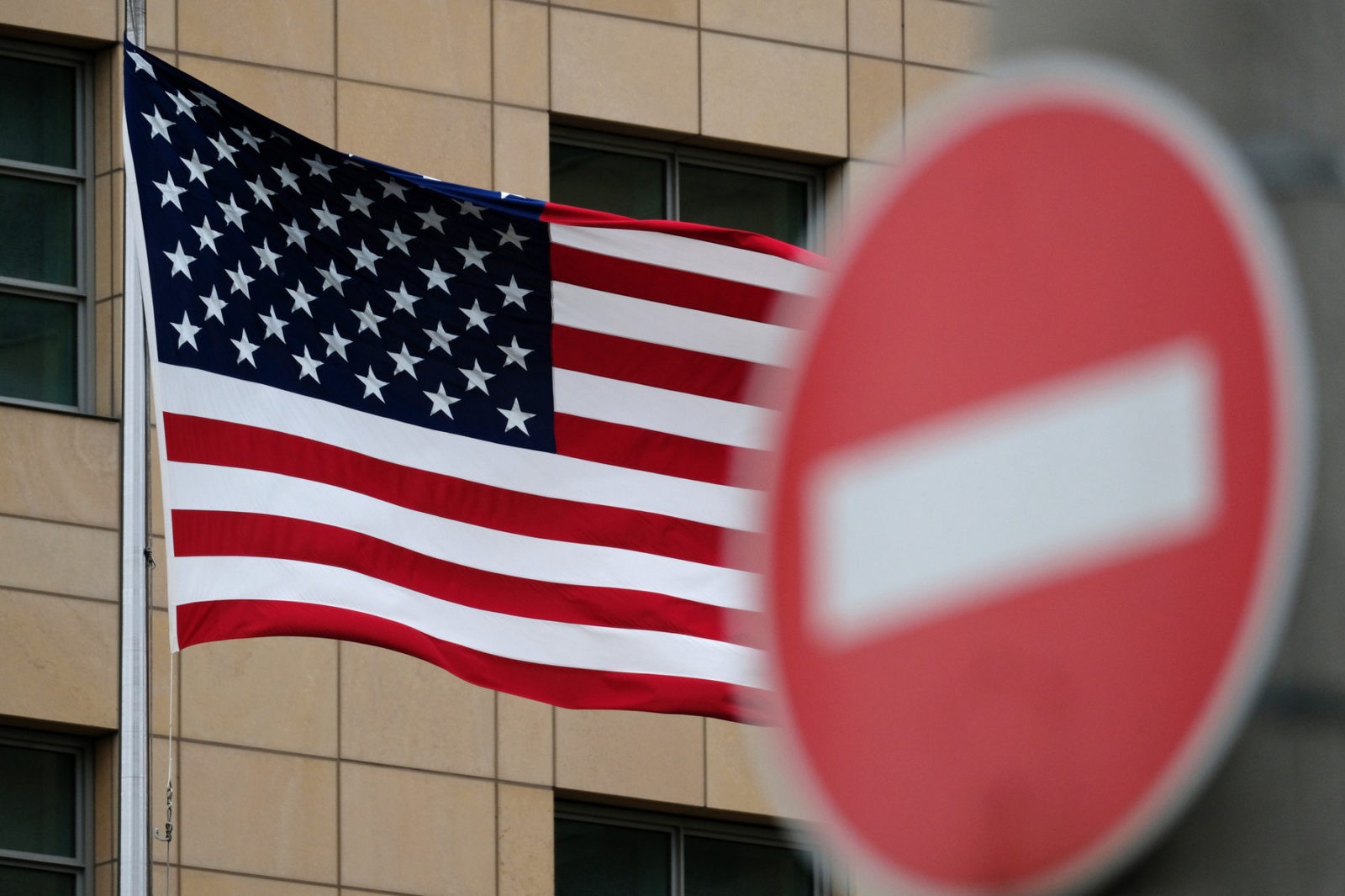A year of sanctions is behind us, and it seems we embark on another. Sanctions were a hot topic in 2018, a year which proved more eventful on that front than anybody had anticipated. If anything is certain, it’s that the Euro-Atlantic states have used sanctions to dial up the pressure on Russia. American and European officials constantly have new reasons to talk about the broadening of restrictions against various Russian individuals and companies. Those reasons will continue to arise.
Recent attempts to dispute the inclusion of certain individuals in the sanctions lists have met with limited success, yielding just a handful of positive results. Russia’s attempts to fight back against the western sanctions regime have proven even more dismal: Moscow’s response of bellicose rhetoric and so-called counter sanctions appear completely ineffective.
With that in mind, let’s recall the key sanctions of the year past. They may have been few in number, but can hardly be called painless. In 2018:
- Western countries increased their overall pressure on Russia. This took the form of the preparation of a number of reports (including the “Kremlin Report”) in accordance with CAATSA, or the Countering America’s Adversaries Through Sanctions Act. Sanctions lists were significantly expanded, and the DASKA bill (Defending American Security from Kremlin Aggression Act) was submitted to the US Congress.
- New grounds emerged for the extension of existing restrictions against several Russian citizens and companies (in particular, the armed incident in the Kerch Strait.)
- The impact of sanctions on Russia’s partners began to be felt (due to the introduction of secondary sanctions on purchasers of Russian arms under the auspices of CAATSA.)
- Differences over sanctions policy arose between the EU and US (one sticking point was the resumption of the US sanctions programme against Iran.) This development could have significant practical importance for Russia.
- Law enforcement practice began to be developed to assist Russian citizens in challenging sanctions brought against them personally (such as the cases of Boris Rotenberg, Viktor Vekselberg, and Valentin Gapontsev, the Oleg Deripaska affair, and several disputes involving large Russian businesses.)
The Russian authorities took steps to counter sanctions and adapt to them. For example, a new department in the Ministry of Finance was created to control external restrictions, and new legislative acts were developed such as the Federal Law “On measures to influence and counteract the unfriendly actions of the US and other foreign states,” and the bill criminalising the implementation of anti-Russian sanctions.)
The Consequences for Russia
All the aforementioned events naturally had consequences for Russia. Firstly, the country’s economy has seen significantly reduced growth rates. According to experts from Bloomberg, the Russian economy could have potentially achieved a growth rate of 10% in the absence of sanctions. Furthermore, by November 1, 2018, the share of foreign investment in Russian state debt had decreased to 25%. By the end of that month, the outflow of foreign investment in the Russian stock market amounted to US$180 million.
Meanwhile, Russian business itself is languishing in a fever. All year long we have witnessed announcements about Russians selling this or that foreign business and other assets. Viktor Vekselberg decided to liquidate the Italian energy trader Eviva, in which he had invested more than 300 million euros. Alisher Usmanov, apparently feeling the shadow of sanctions drawing closer, scurried to redistribute his assets, transferring a controlling stake in Mail.Ru group to the general director of USM holdings. In November news also surfaced that the state-owned banks VTB and Gazprombank are conducting negotiations with several interested investors to sell their block securities in Evrofinance Mosnarbank, which is allegedly used by the Venezuelan authorities to circumvent US sanctions (in 2011, the Venezuelan government bought a minority stake in this Russian bank – ed.)
Importantly, (and perhaps paradoxically) Russian billionaires seem to have finally started to take the sanctions seriously, several years after they were imposed. They have no desire to suffer the fate of Oleg Deripaska, and have their overseas assets frozen. In what is likely an attempt to avoid this, several of Russia’s wealthiest 100 oligarchs, such as Valery Anisimov, Alexander Mamut, and Vladimir Potanin, have begun to sell their yachts.
Not only Russia’s oligarchs are getting concerned; it is clear that foreign business partners are beginning to worry about the possible consequences of violating the sanctions regime. The penalties for offenders are simply too severe for them to risk. Recall, for example, the French bank BNP Paribas, which was fined approximately $9 billion for violating the US sanctions regime. The German company Siemens has also found itself facing serious problems due to alleged ties to sanctioned Russian officials; the company’s employees have come under investigation for their involvement in a deal to supply four gas turbines to Crimea, thus bypassing the sanctions regulations. Moreover, a hefty fine is not the only possible consequence of violating these restrictions. Criminal liability is another, as the director of the Chinese company Huawei has discovered; Meng Wanzhou was recently detained in Canada on suspicion of violating US trade sanctions (the US is requesting Meng’s extradition.)
However, a fightback of sorts has begun. Some Russian citizens have made timid attempts have been made to launch lawsuits with the aim of removing their names from the sanctions lists, thus restoring their previous rights. A number of major Russian companies have also disputed their inclusion in the EU sanctions list; among them are the Almaz-Antey Concern, Sberbank, VTB Bank, Gazprom Neft, Vnesheconombank, and RosNeft, as well as Sberbank’s foreign subsidiaries Denizbank and Prominvestbank. Boris Rotenberg recently took Scandinavian banks to court, accusing them of violating service contracts due to US sanctions. Vekselberg has taken a more administrative approach in his attempts to have himself removed from the US sanctions list, filing a request with the US Treasury’s Office of Foreign Assets Control (OFAC) to lift the sanctions imposed on him by the country’s authorities. The Russian shipping company Gudzon Shipping, which is also under US sanctions, did the same. But this is just the top of the iceberg; the number of requests for administrative review of sanctions may be much, much longer. Besides, not all those who have ended up on the sanctions list wish to publicise their desire to leave it.
Russian oligarchs are not only challenging their inclusion in the sanctions lists, but also the appearance of their names in the so-called “Kremlin Report.” The report, presented by the US Treasury in January 2018, contains a list of oligarchs closely associated with the Russian authorities who are considered to be “reserves” for future US sanctions. One such complaint to the US District Court of the District of Columbia was filed this year by Valentin Gapontsev, co-owner of IGP Photonics, an American manufacturer of fibre lasers. It appears that while IGP Photonics is a strategic partner of the Pentagon, a number of contractors have recently refused to work with the company. In all likelihood, this is a direct consequence of Gapontsev’s inclusion in the “Kremlin Report.” Here, the presence of American citizens and lobbyists was of no help; in fact, they probably proved to be aggravating circumstances.
But that’s not all. In December, nine people who were involved in organising and running the elections in the so-called Donetsk and Luhansk People’s Republics were also hit by new restrictions from the European Union. The US authorities also continue to add new entries to the SDN (Specially Designated Nations and Blocked Persons) blacklist. Alongside Russian citizens, they also include shipping companies and even sanatoria in Crimea.
Actually Existing Sanctions
It is by now plainly clear that the counter-sanctions initiatives, Russia’s legislation targeting those who enforce western states’ sanctions, have proven ineffective. Neither the Federal Law of December 28, 2012 targeting “Individuals Violating Fundamental Human Rights and Freedoms of Citizens of the Russian Federation” (known as the Dima Yakovlev law in Russia and widely seen as a response to the US’s Magnitsky Act – ed.) nor the Federal Law of June 4, 2018 on “Counteracting the Unfriendly Acts of the United States of America and Other Foreign States” are not applied widely. When it came to holding a second reading of bill no. 464757-7 (which proposes to insert an article into Russia’s criminal code criminalising those who refuse to carry out financial transactions due to foreign restrictions), discussion was postponed indefinitely to an unspecified, future plenary session.
Something quite fundamental has changed; sanctions are the reality. Here is not the place to expand on the resulting legal implications and whether the phenomenon meets the classical criteria of a separate legal discipline or doctrine, but suffice it to say that a set of legal norms and institutions now exist which govern certain areas of social relations. However, real legal work, in our experience, amounts to just 40% in the drafting and implementation of sanctions; the rest is determined by international politics, compliance, and media support.
The role of sanctions will grow with every year. Given that outlook, 2019 seems set to bring a storm of sanctions (which more cautious analysts might instead term “increased sanctions pressure from western partners on Russian business.”) I use the word “storm” rather than “pressure” consciously, as new restrictive measures will inevitably be introduced, and the sanctions lists of the US and EU will continue to lengthen.
The Sanctions Forecast
In 2019, we can expect a number of important developments concerning sanctions. Firstly, “chemical sanctions” will be imposed on Russia under the 1991 US law prohibiting the use of chemical weapons. Although these sanctions were announced in late November, they have yet to be implemented. These comprise the second component of sanctions against Russia, which the executive branch of the US government is determined to impose in light of the poisoning of former Russian spy Sergei Skripal. The first package of US sanctions related to the poisoning case entered into force on August 27. Restrictions will include a ban on sales of weapons and dual-use technologies to Russia (technology which can serve either a military or non-military purpose – ed.)
The introduction of so-called “banking sanctions” is also on the horizon. Initially, these sanctions will probably only concern a few banks, none of which are leaders in the finance sector. Nevertheless, that could change. In Spring 2019, two deferred bills from last year will come under consideration: the DETER (Defending Elections from Threats by Establishing Redlines) and DASKA (Defending American Security from Kremlin Aggression) acts.
It’s also worth remembering the “cyber sanctions,” which could be expanded to include many IT companies in Russia. If that happens, those Russian companies will lose access to the US and EU markets (in this light, Usmanov’s attempts to distance himself from Mail.Ru do not seem premature.) Sanctions for concealing information will also be introduced, for which the Kremlin has prepared. In late November, the Russian government issued decrees forbidding Russian banks and credit organisations from disclosing information to third parties, in light of the restrictive measures imposed by foreign states.
Meanwhile, the addition of new names to the CAATSA sanctions list will become routine. Consequently, the top 100 in the Forbes rich list will continue to restructure their assets, often transferring them to their children and grandchildren. They’ll have good reason; joint-stock companies in Russia have been given the signal they won’t be threatened by the SDN blacklist if they steer clear of “toxic” individuals who appear on sanctions lists. However, there is another risk: any transfers of shares or departures from management positions must be for real. Faking these moves will be regarded by US regulators as a circumvention of sanctions, and potentially a criminal offence.
Nevertheless, international trade will be hampered by any tightening of the sanctions regime. As a result of international business partners’ refusals to engage in joint projects with Russia-based companies, foreign investors and their funds will start to leave the country. Attempts by Russian lawmakers to prevent these consequences, such as the introduction of new criminal offences, will not change the situation. In fact, they may only serve as an extra incentive to end business ties with Russian partners.
Geopolitical developments over the past year will also have consequences. The incident in the Kerch Strait could be a reason for yet further EU and US sanctions on Russia. In November 2018, when shots were fired and the Russian military detained three Ukrainian ships in the strait, several politicians resorted to now familiar sanctions rhetoric. The seizure of the three vessels will probably prompt US lawmakers to push for another sanctions bill, in addition to DETER and DASKA (however, it is unlikely that such a bill would pass both houses.)
Furthermore, a number of European states have joined the US in expressing dissatisfaction with the Nord Stream 2 project. German business representatives, however, are not enthusiastic about the US State Department’s attempts to block the project and bring sanctions against companies involved in it. Europe finds itself between a rock and a hard place, with US pressure on one side and domestic business interests on the other. The’s EU resurrection of its famous Regulation 2271/1996 largely passed unnoticed; the regulation aims to shield European businesses from third countries’ attempts to impose their laws extraterritorially. The introduction of sanctions for participating in Nord Stream 2 thus seems extremely unlikely.
Last but not least, the Mueller Commission will soon announce the results of its investigation into possible Russian intervention into the 2016 US presidential elections. If US Presidential Decree 13848 is implemented, this could give rise to yet another round of sanctions on individuals and sectors of the economy.
For aid of reference, let’s call them the “Mueller Sanctions,” and keep watching.










